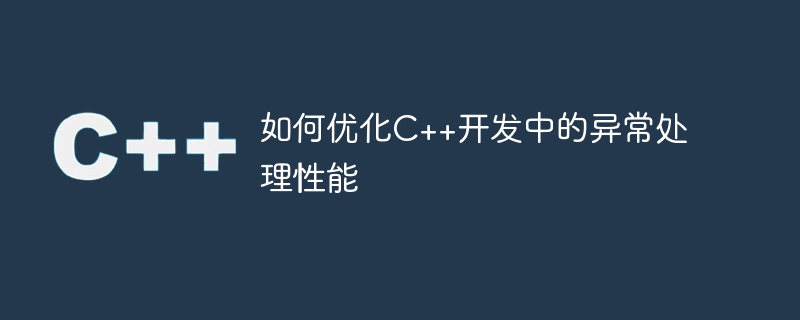Home >Backend Development >C++ >How to optimize exception handling performance in C++ development
How to optimize exception handling performance in C++ development
- 王林Original
- 2023-08-22 11:29:061454browse

How to optimize exception handling performance in C development
Abstract: Exception handling is an important part of C development. However, excessive exception handling may affect the program performance. This article will introduce how to optimize exception handling performance in C development, including reasonable use of exceptions, exception handling strategies, exception handling techniques, etc.
Introduction:
Exception handling is a mechanism used to handle errors or abnormal situations that may occur during program running. C is a powerful and complex programming language, and the importance of exception handling is self-evident. However, some poor exception handling methods will reduce the performance of the program and may lead to problems such as memory leaks. Therefore, in C development, optimizing exception handling performance is crucial.
1. Reasonable use of exceptions
Exception handling is a high-cost operation. Therefore, reasonable use of exceptions is one of the keys to optimizing exception handling performance. When choosing to use exceptions, you should follow the following principles:
- Exceptions should be used to handle truly exceptional situations, not expected normal situations. Using exceptions when handling normal situations can lead to performance degradation.
- Don't abuse exceptions. Excessive exception handling will lead to reduced program performance and reduced code readability.
- Set the exception hierarchy appropriately. The inheritance relationship of exceptions should be logical and easy to catch and handle.
2. Strategy for handling exceptions
When handling exceptions, appropriate strategies should be formulated to optimize exception handling performance. Here are some common strategies for handling exceptions:
- Catch exceptions accurately. Only catch the exceptions that need to be handled in the catch block to avoid unnecessary exception catching.
- Use exception specifications. Using exception specifications in function declarations can inform the caller of the types of exceptions that may be thrown and improve code maintainability.
- Reasonably choose the location of exception handling. Place exception handling in an appropriate location to handle exceptions in a timely manner and avoid exceptions from propagating to places you don't want to handle.
3. Exception handling skills
Reasonable use of some exception handling skills can further improve exception handling performance. Here are some common techniques:
- Use destructors to release resources. When using RAII (Resource Acquisition Is Initialization) technology, the object's destructor will be automatically called at the end of the object's life cycle to avoid resource leaks.
- Avoid throwing exceptions frequently. Excessive exception throwing will reduce performance. You can reduce the frequency of exception throwing by pre-detecting and optimizing code logic.
- Use exception handlers to handle uncaught exceptions. When the program cannot catch an exception, you can use an exception handler to handle it to avoid abnormal termination of the program.
Conclusion:
Exception handling is an indispensable part of C development. However, excessive exception handling may affect the performance of the program. By rationally using exceptions, formulating appropriate processing strategies and applying some optimization techniques, C exception handling performance can be improved and the program can be made more efficient and stable.
Reference:
- Sharpe, D. (2001). Exceptional C : 47 Engineering Puzzles, Programming Problems, and Solutions. Addison-Wesley Professional.
- Sutter, H., & Alexandrescu, A. (2004). Exceptional C : 47 Engineering Puzzles, Programming Problems, and Solutions. Addison-Wesley Professional.
The above is the detailed content of How to optimize exception handling performance in C++ development. For more information, please follow other related articles on the PHP Chinese website!
Related articles
See more- C++ compilation error: A header file is referenced multiple times, how to solve it?
- C++ compilation error: wrong function parameters, how to fix it?
- C++ error: The constructor must be declared in the public area, how to deal with it?
- Process management and thread synchronization in C++
- How to deal with data splitting problems in C++ development

